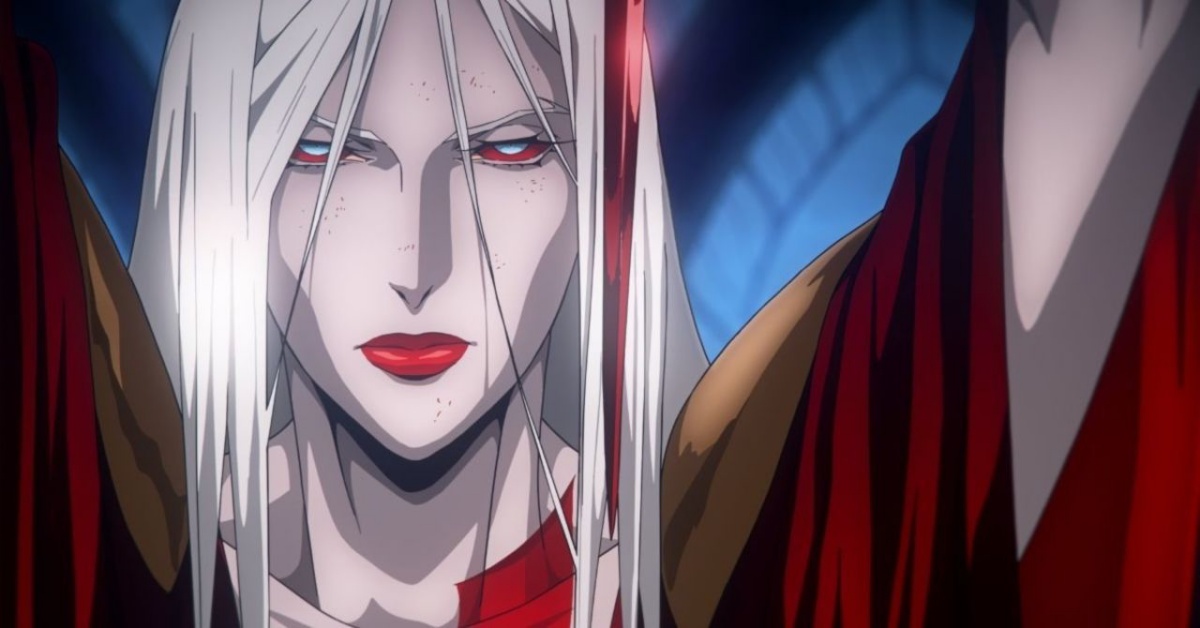Going into the final season of Netflix’s Castlevania, I was excited, but apprehensive. I love the series, and I think that while it is filled with sex, blood, and violence, the core of the series is centered around the tragic love story of Dracula and Lisa Tepes. There is heart at the center of its vampiric corpse, and to end the series I wanted it to find the beauty in all that it had created. Not just the violence.
And it did.
We reenter the world of Castlevania six weeks after the events of last season. Slowly, Sypha and Trevor have found themselves diving deeper and deeper into the darkness as night creatures continue to attack. It is no longer just an adventure; it is a battle for the survival of mankind.
At the core of this struggle is the desire of vampires, and human occultists, to resurrect Dracula so he may continue his war on humanity. Or something. Which brings us all back to the place where all of this bloodshed began, Târgoviște.
Alucard’s reputation has grown as “The” Alucard, and he gets brought in by a village leader named Greta to help protect her people from the coming onslaught of monsters.
Hector is still working for the Sisters of Styria as they go about their plan for creating an empire of blood for themselves. Isaac is coming with his own army and his growing feelings about the nature of humanity and his place within it.
Building up to this final season, I have been rewatching Castlevania with my partner, and with every moment, I was reminded why I enjoyed this show so much, despite being worried it would be all style and no substance. Besides being a sucker for found family, it tackles something I think is key and valuable in vampire stories: the relationship between the monster and humanity.
Vampires especially are interesting because they, in many incarnations, used to be human. Since the days of Anne Rice and her soft boy Louis de Pointe du Lac, we have been discussing the ability of vampires to love, to feel connections to humanity, to be a blight on their former selves, and what good can come of being a semi-immortal being.
Castlevania has been asking that question since it established Dracula fell in love with a human woman. It asked it again, when during their final battle, Dracula allowed himself to be rendered immobile by emotion, realizing the harm he was doing to his son. With season three, the antagonistic Carmilla was surrounded by her “sisters,” a found family of women in what we discover is a very male-led vampire world. Carmilla never loses her edge, but we see her capacity to love and think of others. We see two vampire women being in love with each other.
Season four takes that all to its natural conclusions, weaving into it humans who sometimes feel more animal than human. Isaac and Hector get endings I never fully expected, but hoped for.
We have to wait a long time for the big three of Alucard, Sypha, and Trevor to be reunited, but when they are, it is epic.
The animation is out of this world good, and even with all there is to handle and stuff into these episodes, nothing feels dragged out. Would I have enjoyed a few more episodes to let things breathe? Of course. But when I think of the final few minutes of the show, I smile. It is truly perfect.
Still, if there is one thing that hung over this final season, it was the allegations of sexual misconduct against the series’ creator and showrunner Warren Ellis. Ellis was accused of accused of sexual harassment and abuse by multiple women and worked on this season of Castlevania. Since he will no longer be involved in any spinoffs and was likely paid out at the beginning of the series (typical for Netflix), that is one good thing—but he is still a huge part of the framework of the series, which includes some really great writing for several female characters I love.
I have chosen to focus on the collective work of everyone, including the directional choices of Sam and Adam Deats, who helped bring this story to life.
If you are a fan of Castlevania, this ending will leave you with a smile on your face. A really lovely conclusion that proves that this show was never trying to embrace the darkness—it was always trying to shine a light.
(image: Netflix)
Want more stories like this? Become a subscriber and support the site!
—The Mary Sue has a strict comment policy that forbids, but is not limited to, personal insults toward anyone, hate speech, and trolling.—










Published: May 13, 2021 05:46 pm